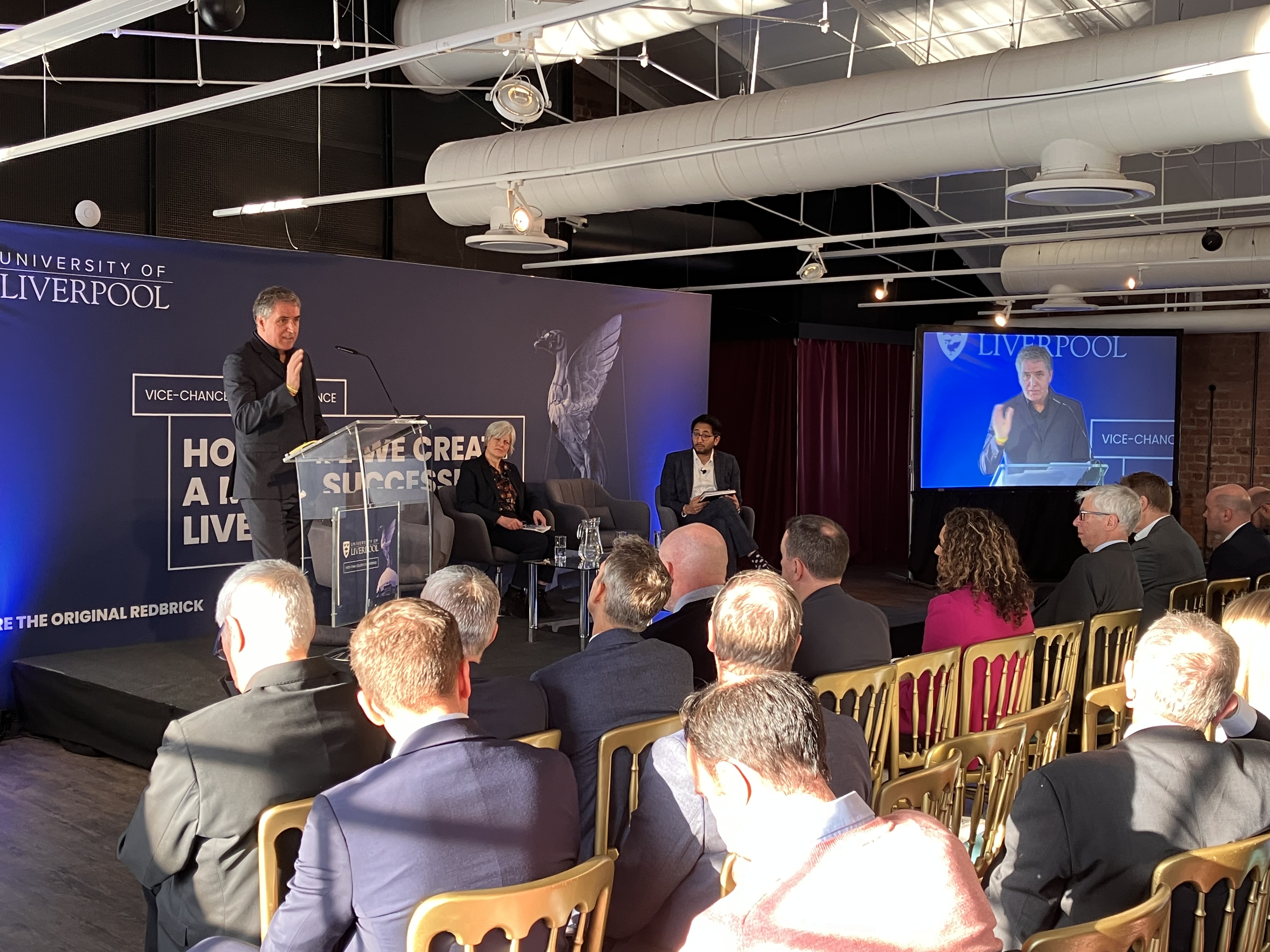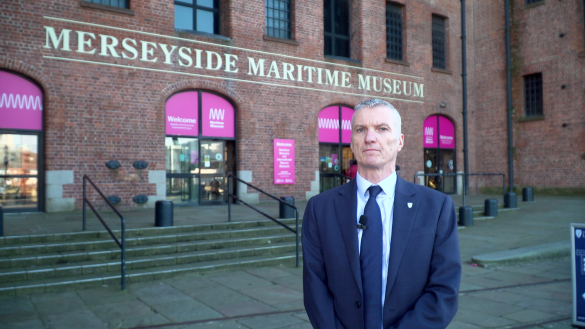What next for KQ Liverpool after Investment Zones?
What will Liverpool look like post Investment Zone funding?
Are Investment Zones a one off or is this an opportunity to build on what could be achieved in the next five years?
Introduction
In the Spring Budget, a refocused Investment Zone programme was announced that will see the creation of 12 Investment Zones across the UK. This includes a health and life sciences Investment Zone in Liverpool City Region, with a package of £80m funding over the next five years.
With a general election upcoming and Investment Zone delivery due to commence in April next year, Knowledge Quarter Liverpool (KQ Liverpool) held a roundtable with some of its key innovation district stakeholders, to consider what’s next for KQ Liverpool and Liverpool City Region in the years to come.
So what does the future look like for KQ Liverpool, the City and the City Region? The below write-up shares an insight into some of the main discussion points and priorities covered during the event, along with some recommendations, shared visions and overarching sentiments for the future.
Asset-based clusters
Following an initial welcome by KQ Liverpool CEO, Colin Sinclair, who Chaired the debate, then opened the discussion to the room, starting with a question around asset-based cluster development and why it is important to the future development of Liverpool City Region.
In response, Professor Matt Reed, Strategic Director of the University of Liverpool’s Materials Innovation Factory, started by saying: “Asset based clusters can have a powerful effect. There is evidence to prove that organically grouped people and high density clustering of knowledge assets drives the economy. I would also suggest that we all need to look granularly at our growth trajectory and engage more with the outside world.”
Professor Janet Hemmingway, Founding Director of iiCON, agreed by saying: “We have got the set-up to be a global power, thanks to our existing industry, academia and NHS supercluster. This is starting to work and the consortium’s effort is delivering real life impact and leveraging new products.” She advised that: “We are still too academic in our approach however, and we need to strengthen our industrial base to leverage further activities in exporting and high value jobs for LCR.”
Civic Data
Following on from this, the conversation turned to why civic data and mental health is so important to inclusive innovation, and how local projects in this field can create global collaborations and encourage new occupiers to cluster in KQ Liverpool.
Professor Iain Buchan, Associate Pro Vice Chancellor for Innovation at University of Liverpool, said: “There is a social impact culture in Liverpool where people swarm if they believe in what they are doing. The Covid-19 pandemic saw people put organisational barriers aside and share data for the greater good. Liverpool gets the job done, and like tonight, gets people in the room who can make things happen.”
Professor Raphaela Kane, Pro Vice Chancellor – Faculty of Health at Liverpool John Moores University, added: “The healthcare workforce needs to ensure they have the right skills for the future and we need to think beyond traditional silos for healthcare delivery. A ‘grow our own’ philosophy will make a significant local impact for employment and health outcomes, as well as attracting the right people in.”
Global reach and scale
The next topic discussed was in relation to ensuring that the projects being brought forward under the Investment Zone also have a global reach and impact.
Providing this international viewpoint was Professor David Lalloo, Director at LSTM, who explained: “LSTM’s focus is predominantly outside of the UK, but its work is relevant to the UK. We are seeing a huge change in countries becoming more wealthy thanks to an explosion of innovation. We need a long term strategy, as funding for global health is changing, and learn from global best practice.”
Dr Carol Costello, Chair of KQ Liverpool and Director of People and Services at the University of Liverpool, added: “We have a network of alumni around the world which provides a huge database that we don’t use as much as we should. We need to think more practically and maximise where there are interrelations that we can join up and benefit from.”
With regards to inward investment, Professor Mark Power, Chair of Sciontec Developments Limited, and Vice-Chancellor and Chief Executive of Liverpool John Moores University, explained: “We don’t have sufficient large scale employers in LCR, but we do have a huge talent pipeline that has business ideas, but these will only form part of the supply chain. We need to identify where there is space for the bigger organisations to come in, as well as growing existing KQ Liverpool based companies. The challenge is selling the LCR lifestyle and incubation space, as we have the ambition to do it, so collectively we can offer a menu of opportunities.”
Commercial investment
Adding to the discussions regarding work space provision and commercial investment into LCR, Andrew Lewis, incoming Chair of KQ Liverpool and Chief Executive of Liverpool City Council, said: “I have been struck by the number of assets in Liverpool City Region, and the concentration of them in KQ Liverpool. We have a big obligation to master plan the estate, as space is precious and not surplus. The Investment Zone has taken opportunities locally and created a network of capabilities which is quite profound, and will attract further attention in the coming years.
“Hosting Eurovision demonstrated how Liverpool’s international brand is real and not just a perception. Referring to social impact, the role of The Pandemic Institute and businesses being attracted here is great, and we’re also attracting students and educating them who will then go into the world of work. It is important but there are massive shortages.
“We have excelled on the academic side, and we now need to nurture commercial indigenous growth from academics and students creating new businesses, and also attracting inward investment. LCC is now making stronger capabilities and connections with the Combined Authorities, creating a stronger ‘to do’ list. It is great to hear the optimism in the room.”
National outlook
Giving a wider view of Liverpool City Region’s capabilities was Sean Davis, Finance Director – Investments at Bruntwood, who said: “From a national perspective, regeneration and the growth of clusters doesn’t happen overnight. Liverpool has to identify its unique set of strengths, which it is already doing, but also needs to try and get investment out of the golden triangle and develop stronger relationships.”
Sally Bloor, Head of Marketing and Communications at Sciontec, agreed and added: “We’re currently aware of a big lab space enquiry and are working on a bespoke pack for this. I think we’re three quarters of the way there in attracting large occupiers, but there is more to be done to refine the micro detail of our offer, in terms of available buildings, their specific location, plus access to R&D and talent. We have worked closely with Growth Platform and have linked up with the KQ Liverpool based Universities to make stronger messaging which is helping. Similarly with attracting Cashplus Bank, colleagues from LJMU, UoL, and the City Council helped pitch directly to them, so I think this type of leveraging should be undertaken more often.”
Communication, collaboration and skills
Further to Sally’s recommendation to refine our offer, Dr Charlie Whitford, Director of Regional Strategy & Engagement at The Manufacturing Technology Centre (MTC), echoed this sentiment by saying: “We need to keep the messaging simple when we’re communicating the story of superclusters. The Investment Zone is commendable, with the capabilities coming together for the greater good, which is greater than the individual parts.”
He also discussed the role of local infrastructure by saying: “People who are looking to relocate place a key focus on the cultural environment in which they’re going to work. As such, the transport in LCR needs to be better, because the city will become clogged if we continue to expand at the same pace. We’re also experiencing a ‘tale of two cities’, as the north of Liverpool needs more development, and we need a positive approach to not being too localised with politics.”
The MTC is a High Value Manufacturing Catapult (HVMC), whose Digital Manufacturing Accelerator is located within Liverpool Science Park (LSP). Another HVMC Centre based at LSP is CPI, and their Strategic Partnerships Manager for the North West, Damian Mohammed, added: “The key challenge we are solving is leveraging public funding to unlock private investment, to ensure projects have longevity and legacy. Having both a commercial focus with social impact makes a real difference, ensuring inclusive innovation. We are working with academic, industry and government-funded stakeholders in the region to help deliver this. We do, however, need to consider how the new Investment Zone projects will find the talent needed to deliver their impact, and we are working with the region to identify the skills of the future. We need to start working with schools, colleges and universities now, to develop STEM skills for the next 5-10 years.”
Workspaces of the future
Aligned with the future vision theme, Leanne Katsande, Head of Commercial at Sciontec, shared how “Space requirements have gone full circle, and lab occupier demand has grown significantly. Flexibility is essential and all of our developments will be futureproofed for occupiers so we can accommodate ongoing enquiries.”
Architectural practice, Fairhursts Design Group, have been behind some of the largest and most innovative lab schemes in the UK. When asked about how KQ Liverpool could differentiate and future proof new lab schemes, Laura Sherliker, Director at The Fairhursts Design Group, explained: “Labs requirements are ever changing, although building stock is finite. We need to make buildings not monuments, and civic architecture needs to be for locals and not contain any social barriers. For this, we must link up with schools and other groups in the community. Having the right strategy and vision is so important, so we need to consider how buildings will change in the next 5-10 years. I think smaller, tech enabled labs will be more in demand, although these use a lot of energy, so we need to set a sustainability agenda now and continuously strive for better standards.”
Rob Hopkins, Director at AHR (who was the lead architect when designing The Spine in Paddington Village), offered an additional view point, saying: “With regards to innovative workspaces of the future, we can no longer detach living and work spaces. We need to have the confidence to bring together both elements at Paddington Village, and we have a great opportunity to do it first and to do it best. What has been done at The Spine can be done with living spaces, as well as other workspaces.” He also added: “KQ Liverpool has the ability to bring all of the right ingredients together. Occupiers want the greatest place and environment for their workforce to thrive. We should think cleverly about existing spaces too and use what we’ve got.”
Living labs
Lorna Green, CEO of LYVA Labs explained that: “We have already seen the benefits of flexible work space and connectivity for our own company, and as a result of the investment we’re putting into creating new companies in the region, they will need somewhere to locate. The LCR Investment Zone means that we can run this additional accelerator space.”
She also set an interesting challenge for participants to consider. “After Investment Zones, I’d like to turn LCR into a living lab for healthcare. We can’t underestimate the importance of wrap-around support for startups, and we have got so many of the other building blocks already, like knowledge assets, data, and training. Through this support, businesses can then turn into innovators and scale.”
“Bring it on!” was the immediate response from Jan Ledward, Director of Strategy and Partnerships at Liverpool University Hospitals NHS Foundation Trust. “A living lab would provide a combination of mental and physical health solutions within a care environment. We should also create doctors of the future who have a wider view of conditions, although we really need these skills now, not 5 years in the future.”
Partnerships and talent retention
Professor Tom Solomon, Director of The Pandemic Institute, discussed the benefits of partnerships, by saying: “I’d like to see more conversations about commerce, not academia, although we have a strength in joining them up through The Pandemic Institute, the city council and higher education partners. International partners have also been built up over many years and a recent visit to Bangalore has led to an exciting new partnership, but there were no council or commercial delegates on the trip, which I think was a missed opportunity.”
Linking back to Professor Mark Power’s point, Tom added: “Big companies have looked at locating within LCR, but they didn’t actually land here. We should have a drive to try and build new facilities, like our proposed pandemic preparedness and response laboratories, so that we can attract and accommodate these larger enquiries.”
Addressing the group next from KQ Liverpool’s perspective, was Rachael Stevens, Head of Partnerships and External Relations, who said: “The Investment Zone presents an opportunity for projects to happen, but we need to focus on bringing a spatial focus together to promote it externally. We can also use the Investment Zone as a way to attract graduate talent, but we need skills and mid management roles for the 25-40 year old workforce, as this is where we are losing people to other cities.”
Optimism for the future
To summarise the Roundtable, Andrew Lewis, incoming Chair of KQ Liverpool, said: “I’d like to end on a note of optimism and self confidence about our future. We’re all aware of the gaps we’re facing and when we put the table of points together, we get a platform for growth. Where we are now is incredibly powerful. We’ve got a common strategy, a fantastic global brand and have a real focus on what we’re good at. We should never be complacent, but we’ll succeed with partnership working. I think we should also look at Greater Manchester as a coalition opportunity rather than a competitor, and similarly with London.”
Colin Sinclair concluded: “This is just the start. I’ve seen massive change already since we created the Knowledge Quarter Liverpool innovation district in 2016 and I know this progress will continue, thanks to the people in this room and our wider partnerships.”



